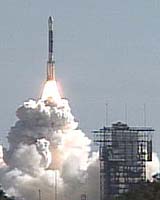Mars Options
Monday, January 10, 2005
To truly advance manned exploration of space, a single, definitive, long-range plan has to be developed, agreed upon, and pursued on an international level. There are several possible approaches, each having its advantages and problems, as weel as detractors and advocates: However, all start out by heading to Mars; the one place with all the fundamental building blocks to sustain Earth's form of life. The approaches:
Space station continuance, Lunar outpost, Manned Mars mission
The previous NASA, go slow approach. Supposedly the safest and having the most subsidiary benefits, but unquestionably the most expensive and lengthy. The theory is such ‘baby step’ approach provides the best safety factor, as well as lower probability of catastrophic failure. The issue is both a cost and a focus factor; is today’s society capable of the kind of diverse, yet directed, long-term effort?
Space Station de-emphasis; Lunar outpost, Mars mission
This argument, currently held by many in the Bush Administration (including the boss), recognizes what has happened over time; that the Space station plans grew to a point to consume the resources and the focus of outward-bound manned efforts. Bureaucracy and political back-scratching has taken hold. It is time to recognize that the value of the Space Station effort toward the final goal has grown minimalistic and the time has come to redirect the primary efforts elsewhere. Bush sees it this way and NASA has reluctantly responded. I doubt my fellow blogger Maryam agrees with this, but that’s freedom of speech. She is more than free to blast me on it; I’m the theorist here, she the one who does it (hopefully).
Direct to Mars mission
This position is strongly advocated by a small, noisy, but technically competant group called the The Mars Society, their primary spokesman being Dr. Robert Zubrin. Their point is that all other steps are unnecessary and detract resources from the key first goal. They have a pretty tight argument and technology plan of sending unmanned processing plants to use the thin atmosphere of Mars to produce essential supplies and return fuel prior to sending the exploration team. My own background in biology and chemistry tells me the approach is feasible. Risky, but certainly the least expensive and potentially quickest result. The problem; they lack any significant support in governmental circles, the only place that- for now- matters.
Myself, I lean toward the third option, though I don't think it will happen. The first is not focused enough and the second could get tied up in providing resources continually to a Lunar colony, if the resources (primarily water) all have to be shipped from Earth. However, if some source of water (underground ice or- very unlikely- a small, redirectable NEAR asteroid and a viable acquisition plan) can be found on the moon that would allow local generation of resources necessary to sustain a lunar outpost, it would be a less-risky first step.
Comment what you think.



